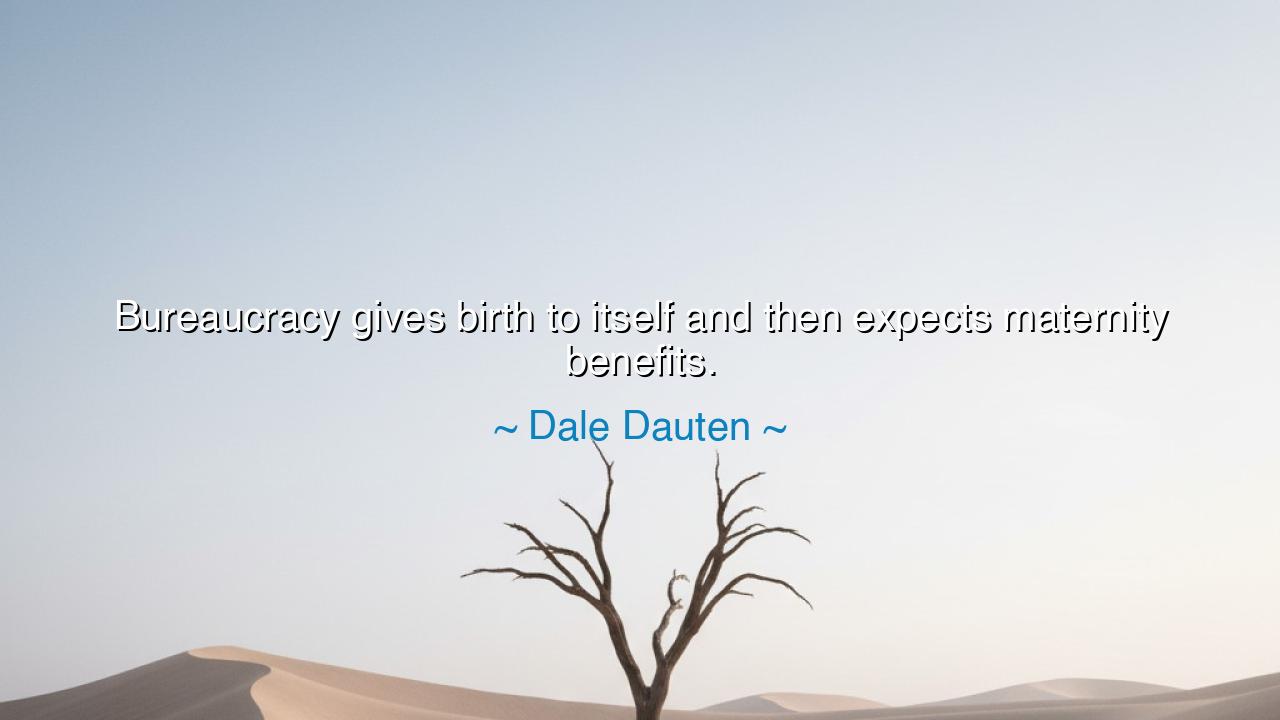
Bureaucracy gives birth to itself and then expects maternity






When Dale Dauten wrote, “Bureaucracy gives birth to itself and then expects maternity benefits,” he spoke with the wit of a satirist but with the insight of a prophet. His words, though wrapped in humor, reveal a profound truth about the nature of power, institutions, and human folly. Bureaucracy, in its original form, was meant to serve — to give order to governance, structure to justice, and stability to society. Yet, as Dauten warns, once born, bureaucracy rarely remains the humble servant of the people. It grows of its own accord, multiplying like vines upon a once-living tree, feeding not on purpose, but on its own existence. And, in the end, it has the audacity not only to sustain itself but to demand reward for perpetuating itself — as if it were both parent and child of its own creation.
The origin of this quote lies in Dauten’s sharp observation of modern organizational and governmental life. A writer and business thinker, he saw that systems designed for efficiency often transform into labyrinths of inefficiency. His humor exposes the great irony: that bureaucracy, once meant to simplify, inevitably complicates; once meant to serve humanity, ends by consuming it. Like ancient monsters of legend — born from the fears of mankind and sustained by its obedience — bureaucracy, once unleashed, becomes self-replicating. It creates committees to oversee committees, reports to justify reports, and rules to enforce rules — until no one remembers what purpose it once served. It gives birth to itself, and then lives off the illusion of its necessity.
This idea is not new; it is as old as civilization itself. The empires of ancient Rome and China, both masters of administration, ultimately fell prey to the very systems that once made them mighty. In Rome, officials multiplied like stars in the night sky, each demanding authority and tribute, each building new offices and titles to justify his power. Taxes rose, corruption spread, and the bureaucracy became a creature unto itself — bloated, slow, and unaccountable. The state that once commanded legions and law became buried under its own paperwork. As the historian Tacitus once wrote, “The more corrupt the state, the more it legislates.” Thus, even the ancients saw the truth Dauten would later phrase with humor: bureaucracy is a living thing, but its purpose is to feed itself, not to nourish the people it was born to serve.
In the modern world, this cycle continues, magnified by technology and time. Governments, corporations, and institutions spawn departments, agencies, and task forces — each claiming to solve a problem, yet often creating new ones. Once a department exists, it must justify its budget, its salaries, its relevance. It must grow, or die. And so, it breeds new projects, new paperwork, new positions. What was once a simple goal — to help, to organize, to serve — becomes an empire of procedures and red tape. And when criticism comes, it protests like an indignant mother: demanding more funding, more resources, more attention — the maternity benefits of its own creation. Dauten’s humor becomes prophecy: bureaucracy is not merely inefficient; it is self-perpetuating arrogance clothed in the language of necessity.
One might recall the tragedy of the Soviet Union, where bureaucratic machinery grew so vast that it became disconnected from reality itself. Millions starved while reports showed record harvests; factories stood idle while paperwork declared record production. Bureaucracy had ceased to serve the people and had instead built a shrine to itself — rewarding loyalty to form, not truth. Even in democratic nations, the same pattern lingers in subtler forms: governments that cannot reform because reform threatens the very web of offices and agencies that keep them alive. It is as though mankind has built an idol of process and now bows before it, forgetting that the idol was of his own making.
Yet, Dauten’s quote is not only criticism — it is a call to awareness. His humor hides a moral command: to remember the purpose of every institution, every rule, every law. For just as bureaucracy can grow in governments, so too can it grow in the human heart. We create systems of excuses and justifications, layers of hesitation and fear, until we no longer act for truth, but for habit. The same spirit that clogs the veins of nations can clog the soul of man. To fight bureaucracy, one must first fight the comfort of complacency.
The lesson is eternal: systems are meant to serve life, not the other way around. When rules become more important than people, when paperwork outweighs purpose, when the machine demands to be fed though it no longer creates — then civilization begins to decay. The wise must be vigilant, pruning the excess, returning to simplicity, asking always: “Why does this exist? Whom does it serve?” In government, in business, in the private workings of the heart, renewal begins with that question.
So let this teaching be passed on: do not worship what you have built. Let no institution forget its origin in human need. Like all things made by man, bureaucracy must be watched, limited, and renewed — or it will devour its master. Remember Dauten’s jest, for it carries the gravity of truth: that even the systems we design to help us can become our burdens if left unchecked. The wise will laugh — but then act — pruning away what no longer serves, and preserving only what gives life. For in that vigilance lies the difference between a government that serves the people, and a machine that rules them.






AAdministratorAdministrator
Welcome, honored guests. Please leave a comment, we will respond soon